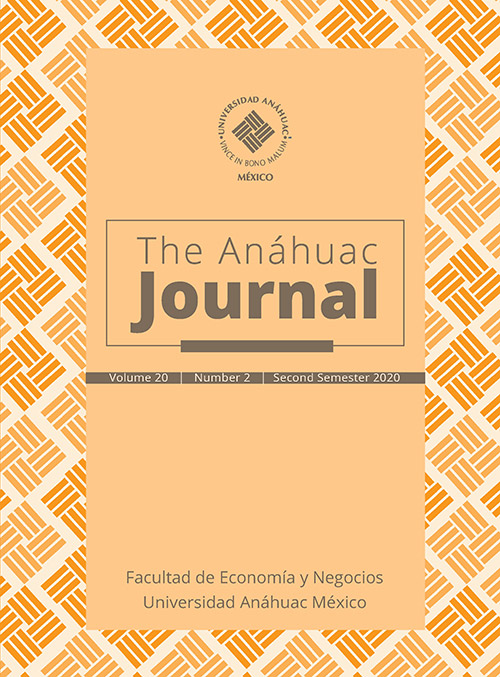Articulation of ethics and strategy to integrate stakeholder expectations through higher purpose
Main Article Content
Abstract
This article is intended to contribute to the debate on the implications of the decisions and actions of companies in society, to find an alternative that allows them to include in their strategies not only the aspirations of the shareholders, but also the expectations of other stakeholders. To achieve this, we rely on the authors that have contributed to consolidating the strategy as a field of study and on professors from the School of Valencia. This text recognizes human interdependence and the importance of different social actors, including companies, participating according to their roles in society to achieve the results they expect and, at the same time, generating a positive impact on their environment. As a conclusion, it is proposed that, in order to incorporate the expectations of all stakeholders, companies articulate not only their business model with the higher purpose and objectives, but also ethics with strategy.
Downloads
Article Details
This work is licensed under a Creative Commons Atribución-NoComercial-CompartirIgual 4.0 Internacional.
References
York: Prentice Hall.
Andrews, K. (1985). El concepto de estrategia de la empresa. Barcelona: Ediciones
Orbis.
Bower, J. (1997). Oficio y arte de la gerencia. Bogotá: Grupo Editorial Norma
«Business Roundtable, la poderosa organización que ahora quiere redefinir las reglas
del capitalismo» (23 de agosto de 2019). BBC News. Mundo. https://www.bbc.
com/mundo/noticias-49415933
Camacho, I., Fernández, J. y Miralles, J. (2005). Ética de la empresa. Bilbao: UNIJES.
Casado, A (2008). Bioética para legos. Una introducción a la ética asistencial. España:
Plaza y Valdés.
Conill, J. (2006). Horizontes de economía ética. Madrid: Editorial Tecnos.
Cortina, A. (2003). Ética de la empresa. Claves para una nueva cultura empresarial.
Madrid: Editorial Trotta.
Cortina, A. (2004). Por una ética del consumo. Madrid: Editorial Taurus
Cortina, A. (2008). Ética aplicada y democracia radical. Madrid: Editorial Tecnos.
Cortina, A. (2009). «Ética de las empresas no solo responsabilidad social». Revista
portuguesa de Filosofía, vol. 64 (1/4): 113-127.
Chandler, A.D. (1962). Strategy and Structure: Chapters in the History of the American
Industrial Enterprise. Cambridge: MIT Press.
Schwab, Klaus (2020). Manifiesto de Davos 2020: El propósito universal de las empresas
en la cuarta revolución industrial. Foro Económico Mundial. https://es.
weforum.org/agenda/2019/12/manifiesto-de-davos-2020-el-proposito-universalde-
las-empresas-en-la-cuarta-revolucion-industrial/
Freeman, R.E. (1984). Strategic management: a stakeholder approach. Boston: M.A.
Pitman.
Friedman, Milton (13 de septiembre de 1970). «The social responsibility of business is
to increase its profits». The New York Times. https://www.nytimes.com/1970/09/13/
archives/article-15-no-title.html
Friedman, M. (1997). «La responsabilidad social de los negocios es aumentar sus
utilidades» (pp. 195-203). Joseph L. Bower. Oficio y arte de la gerencia. Colombia:
Editorial Norma Cargraphics.
García-Marzá, D. (2004). Ética empresarial. Del diálogo a la confianza. Madrid: Editorial
Trotta.
Hambrick, D., Nag, R., Chen, M. (2007). «What is strategic management, really?
Inductive derivation of a consensus definition of the field». Strategic Management
Journal, vol. 28, núm. 9. https://www.scopus.com/record/display.
uri?eid=2-s2.0-34547849642&origin=inward&txGid=0ba40ece61f944dd06084
b43da05b67d
Hamel, G. y Prahalad, C. K. (1990). «The core competence of the corporation».
Harvard Business Review, mayo-junio, núm. 6528: 79-91.
Hamel, G. y Prahalad, C. K. (2005). «El propósito estratégico». Harvard Business Review,
vol. 1. http://www.ucipfg.com/Repositorio/MAES/MAES-03/Unidad3/
Proposito_Estrategico.pdf
Hauge, A. L. y Knudsen, D. R. (2017). «Organizational purpose in management control
systems: a case study on how two Norwegian organizations operationalize their
purpose». Tesis de maestría en Economía, Bergen, Norwegian School of Economics.
https://openaccess.nhh.no/nhh-xmlui/bitstream/handle/11250/2454022/
masterthesis.PDF?sequence=1&isAllowed=y
Held, D. (2006). Modelos de democracia. Madrid: Alianza Editorial.
Hill, Ch. y Jones, G. (2011). Administración Estratégica. Un enfoque integral. México:
Editorial Progreso.
Johnson, G., Scholes, K. y Whittington, R. (2005). Dirección Estratégica. Reino Unido:
Pearson Prentice Hall.
Kates, A. y Galbraith, J. (2007). Designing your Organization. San Francisco: Jossey-
Bass.
«Los jóvenes prefieren comprar los productos de las marcas que trabajan
por el planeta» (23 de enero de 2020). La República, Recuperado el 27 de
mayo de 2020 de: https://www.larepublica.co/responsabilidad-social/losjovenes-
prefieren-comprar-los-productos-de-las-marcas-que-trabajan-por-elplaneta-
2955250
Lozano, J.F. (2004). Códigos de ética para el mundo empresarial. Madrid: Editorial
Trotta.
Mintzberg, H. Quinn, J.B. y Voyer, J. (1997.) El Proceso Estratégico. Conceptos, contextos
y casos. México: Prentice Hall Hispanoamérica.
Mintzberg, H., Ahlstrad, B. y Lampel, J. (2007). Safari a la estrategia: una visita guiada
por la jungla de management estratégico. Buenos Aires: Granica.
Montgomery, C. (2013). El estratega. Conviértete en el líder que tu negocio necesita.
Bogotá: Aguilar.
Montgomery, C. y Collins, D. (1995). «Competencia basada en recursos: estrategia
de los noventa». Revista Eficiente, núm. 68: 6-21.
Naciones Unidas, ONU (2015). Objetivos de Desarrollo Sostenible. https://www.
un.org/sustainabledevelopment/es/objetivos-de-desarrollo-sostenible/
Norton, D. y Kaplan, R. (2000). Cuadro de Mando Integral. Barcelona: Gestión 2000.
Osterwalder, A., y Pigneur, Y. (2011). Generación de modelos de negocio. Barcelona:
Deusto.
Parker, Ceri (2020). «El Foro Económico Mundial a los 50 años de su creación: una
cronología de los aspectos más destacados de Davos y más allá». World Economic
Forum: 15 de enero de 2020. https://es.weforum.org/agenda/2020/01/
el-foro-economico-mundial-a-los-50-una-linea-de-tiempo-de-los-aspectos-masdestacados-
de-davos-y-mas-alla-0a5878479e/
Porter, M. (1997a). «¿Qué es estrategia?». Revista Clase Empresarial 45, marzo: 81-92.
Porter, M. (1997b). «De ventaja competitiva a estrategia corporativa» (pp. 55-89). En
Bower, J., Oficio y arte de la gerencia (vol. I). Bogotá: Norma.
Porter, M. (1999). Ser competitivo. Nuevas aportaciones y conclusiones. Bilbao: Editorial
Deusto.
Porter, M. y Kramer M. (2006). «Empresa y sociedad. Vínculo entre ventaja competitiva
y responsabilidad social corporativa». Harvard Business Review, vol. 84,
núm. 12: 3-15.
Restrepo, Beatriz (2014). Reflexiones sobre educación, ética y política. Medellín: Fondo
Editorial Universidad EAFIT.
Senge, P. (1992). La quinta disciplina. El arte y la práctica de la organización abierta al
aprendizaje. Barcelona: Editorial Granica.
Sinek, S. (2009). Empieza con el porqué. España: Editorial Empresa Activa.
Siurana, J. C. (2009). La sociedad ética. Indicadores para evaluar éticamente una sociedad.
España: Editorial Proteus.
Wit, B. de y Meyer, R. (2010). Strategy Synthesis: Resolving Strategy Paradoxes to create
competitive advantage: Resolving Strategy Paradoxes to Create Competitive Advantage
(3ra ed.). Reino Unido: Cengage Learning.

